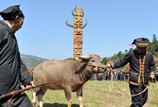
CAIRO, Feb. 23 (Xinhua) -- Egyptian President Mohamed Morsi rescheduled the parliamentary elections date for its conflict with the Coptic feasts, official Ahram online reported Saturday.
According to a presidential decree, the parliamentary elections, previously scheduled to begin on April 27, have been brought forward to start on April 22.
The elections will take place in four stages and last for three months. The first stage of voting will be held in five provinces including Cairo, Beheira, Port Said, North Sinai and el-Minya on April 22-23, with a run-off scheduled for April 29-30.
The second stage will be held in eight governorates including el Giza, Alexandria, Sohag, Beni Suef, Aswan, Suez, Red Sea and New Valley on May 11-12, with a run-off on May 19-20. The third stage will include also eight governorates: Daqahliya, Qalyubiya, Minufiya, Qina, Damietta, Luxor, Matruh and South Sinai. It will start on May 28-29 and its run-off will be on June 5-6.
The last stage will be held on June 15-16 with a run-off on June 23-24 in six governorates: Gharbiya, Sharqiya, Asyut, Kafr-el- sheikh, Faiyum and Ismailia.
The first session of the new parliament is scheduled to be held on July 2.
On Thursday, Morsi issued a presidential decree, calling on parliamentary elections to be held on April 27, but Christian Shura Council members submitted complaints Saturday as the elections would be held during their Easter celebrations.
The president promised earlier Saturday to reschedule the date of elections to avoid conflict with the dates of Lazarus Saturday and Palm Sunday, two important days in the church's pre-Easter calendar.
Before Morsi announced the new election date, the Coptic Consultative Council said the president's decision was a provocation and disrespect for the Coptic religious holidays.
The council also complained about the constituency division, and called for boycotting the elections, saying that the elections pave the road for certain group, in reference to the Muslim Brotherhood, to which the president is affiliated.
High Institution for Wafad party has announced its rejection of the president's decision, saying that it was issued in violation of laws and constitution, as well as the current political and security conditions.
Mohamed El-Baradei, leading figure of Egypt's main opposition group National Salvation Front, and also head of al-Dostour Party, on Saturday called on the citizens to boycott the parliamentary elections. "Boycotting the elections completely is the fastest way to reveal the bogus democracy and to assure our credibility," he said on twitter.
However, political expert Moustafa El Nagar told Xinhua that boycotting the elections is a dangerous step because it may facilitate the Muslim Brotherhood in controlling both executive and legislative councils.
He added that by boycotting the elections political forces may isolate themselves from popular bases and see their social influence vanish.
Mohamed Zydan, a spokesperson of the Muslim Brotherhood's Freedom and Justice Party, described the opposition's decision to boycott the elections as "political bankruptcy," predicting "wide participation in the coming elections."
Zydan said the coming poll is a good opportunity for all parties to prove their presence on the ground. "The elections will be run under full judicial supervision, along with monitoring by Arab and international media, as well as foreign civil and human rights organizations," the spokesperson added.
















 Provocative propaganda on environmental protection leaded by Chen Guangbiao
Provocative propaganda on environmental protection leaded by Chen Guangbiao


![]()
